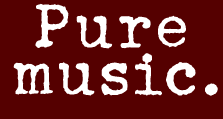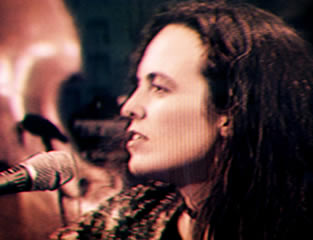 |
 |
|||||||||
A CONVERSATION WITH SUSAN MCKEOWN (continued)
SM: It makes you into a stronger person, if you enter this business as such. And it's very invigorating. It's an interesting time to be a woman. Well, it's always been an interesting time to be a woman, but never more than now. I wouldn't want to have lived any time before now, because the chances of not living free were quite high, so I'm pretty happy with where I am right now.
PM: You're performing, singing with an astonishing degree of freedom, I think. Silently pushing the inherent value of that.
SM: I hope that I take risks. I don't like to play it safe.
PM: My understanding is that Brendan Jamieson is both husband and manager to you. How did you meet, and how does that dual role work out?
SM: We met in New York. He came to a gig, and that was his first night in New York. We married three months later, to the day.
PM: You're killin me. [She laughs] So, what's he like, what kind of a man is he?
SM: My soul mate, my best friend. Like my other half, you know.
PM: Where's he from?
SM: From Oregon. So we both came from 3000 miles away to New York, but from opposite directions.
PM: So, he's second generation Irish, or?
SM: No. More than that, actually.
PM: Further removed.
SM: In the 1700's or so, they came over. Coupla two three greats, as they say in New York. Meaning quite a few.
PM: You know, our people are from just up the road from you, in Dundalk.
SM: Are they, the Goodmans? Because the McKeowns are from there, too.
PM: Really?
SM: Yes, that region. There's a McKeown's Pub in Dundalk.
PM: We're specifically from Hackball's Cross.
SM: Wow. I don't know the area that specifically. There's a good gig up there, The Spirit Store. I'll mail you the information. Have you been to Hackball's Cross?
PM: Not since I was 20, but I did find some people that knew my grandmother, and they each went on about what a fine singer she was, and how you could hear her from three fields away, and all that.
SM: Ah. Was she a Goodman, then?
PM: No, most of us were Hannons or Brennans. I've almost changed my name to Brennan several times.
SM: That's a good name.
PM: So, you've attracted and developed an amazing circle of international talent around you. I'd love to have a few words on that subject. For openers, bassist Lindsey Horner is someone very special.
SM: He is. I met him a couple of years after I came here, so I've been playing with him for seven years. We had a lot of connections in the past, but we'd never actually met. We had a lot of mutual friends. He was playing in a band in Dublin with a guy who was teaching me percussion at one stage, and one of his closest friends was teaching me Gaelic. At the same time, she was hanging out with him, but I was still a kid in high school. We actually met in New York some years later, after he'd spent time in Ireland. He'd graduated from high school and gone to Ireland to earn his music degree there. He'd visited there with a friend of his family when he was 12, and he loved it there. So he couldn't wait to get back. He took his degree in Ireland, then went to Julliard, and then decided to study jazz with one of Ireland's greatest guitar players, Louie Stewart. In fact, we just went to see him play at the Village Vanguard about a month ago. And my mother had taught piano to Louie Stewart. There's all these little connections. So I think we were meant to play together. He obviously had a great interest in things Irish and Irish music. Apart from a very strong jazz background, he's deeply interested in traditional Irish music. So we've been able to explore that a lot in the material we play in my band.
PM: It's an uncanny Irish/jazz connection. Because it's not only his spirit, but yours, that has everything to do with both of those traditions.
SM: That's true.
PM: So, how about some of the other key players in the ensemble?
SM: Well, on Lowlands I worked with a lot of people I hadn't worked with before. Living in New York gives you a great opportunity to meet lots of different musicians that either live here or are passing through, especially in the area of world music. A couple of the Irish musicians we used just happened to be in New York because they were working on Riverdance. People like Eilis Egan, who plays the box, which is the button accordion, and Des Moore, a wonderful Irish guitarist, both of them were here working on Riverdance. And people like Wang Guowei, he plays the erhu, the Chinese fiddle.
PM: Oh, that's such an unearthly sound.
SM: I had that sound in my head, but it had been other people playing it. But then I heard Wang Guowei on TV, in an Audi commercial. I happened to have been in an Audi commercial myself, so I knew who to call to find out who that player was. It turned out that he lived not far from here. They had an office in Chinatown, he directs the Music from China Ensemble.
PM: And how old a fellow is he, forties?
SM: I don't know, maybe mid to late thirties. He's only been here four years. His manager came down with him, because he doesn't have a lot of English. So she was able to translate what I wanted, and he had listened to the song and already worked up a wonderful solo, he really came in prepared. Then I said, "Before we start, at the beginning, would you just play a Chinese folk song, in the same or a similar key?" He played a beautiful little Chinese folk song at the top, and we ended up using that as the introduction to the piece.
PM: That was so crafty, so very smart of you.
SM: [laughs] And it was so smooth, that session was only three hours long, two or three. The erhu is like something from another world, and that's what I wanted for that song. Because the Lowlands of Holland is a song that's sung in Ireland with a different melody, in a major key. And when I heard this one, I like the dark melodies, you know? And also the line "Where the sugar cane is plentiful, and tea grows on every tree," well, we know he's not talking about the original Holland, the Netherlands, it must be some kind of Dutch colony. My father thought it was the West Indies, because he lived in Barbados for a while. So I wanted to bring in some kind of instrumentation that would... [accidentally erased this phrase]..this would be that and the banjo. The banjo player's from Dublin, he lives here in the East Village.
PM: And just a wonderful banjo technique on that song, very unusual.
SM: Yes! He said, "Let me try and get a higher pitch," so he played further up on the neck. Said he wanted to get more of a feel of, something...far away.
PM: It's amazing, because of the skin head, how Oriental the banjo can sound. So that was another pretty brilliant stroke, putting the erhu and the banjo together...was it you that devised these unusual couplings?
SM: Yeah.
PM: That's definitely some High Priestess type activity. [she laughs] There's other players we must mention. The tablas were incredible on the record!
SM: Yeah, that guy's great. He played on my other album of traditional music, Samir Chatterjee is his name. He lives here in Queens, and he has a school of music. He teaches there with his wife, she's a singer, and I think his son might teach as well. And he performs with a lot of well known jazz cats, you know, and world music ensembles.
PM: I think he's played with my friend Ken Zuckerman, a great sarod player who has a music school in Basel.
SM: I do know he plays all over the world. I was doing a radio interview in Belfast, and the interviewer said, "Oh, we had Samir Chatterjee here last week." [laughs] I couldn't believe it, because I hadn't even met him yet. He did the tracks on that first record and I wasn't present at that session. I was making three different records at that time. So I didn't get to meet him until the Lowlands sessions.
PM: So, let's see, who are some of the other important players...those are the esoteric ones that we really needed to cover.
SM: That's true.
PM: Irish culture, especially music and dance, has been a subject of huge media attention for a number of recent years, and it appears to have grown ever more popular as a vacation destination. Is the public still Irish crazy, and has that been good for you?
SM: Oh yeah, definitely. I mean, when you're Irish, people have an expectation of, say, entertainment. They expect a song out of you. They might expect a sense of humor, or that you'll buy a round of drinks. But there is this mystery connected to the whole Celtic world. And, even as an Irish person, when I was a teenager, listening to groups like Clannad, I was aware of that. I found a dark, mysterious sound in our folk tradition that was like our own form of the blues.
PM: Of course! That's what it is...
SM: Because the tunes are quite exuberant, and can be very joyful, and take you to another place of exhilaration. While there are happy ones, many as we know are sad, and seem to come from a very deep place, and a very old place. The messages are handed down. We really don't know who wrote them. But they wanted to hand the message down. So there's some kind of spiritual connection, I think, that a lot of people feel when they're listening to those ancient melodies. continue